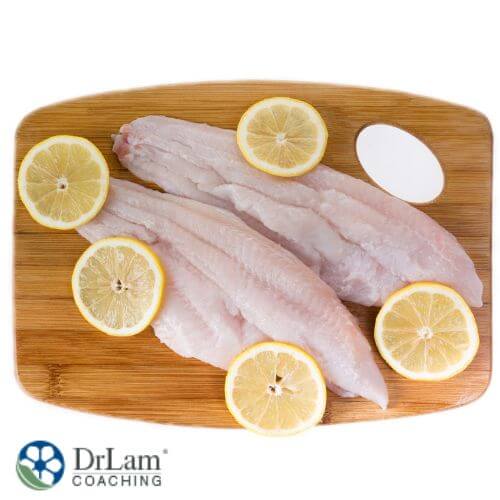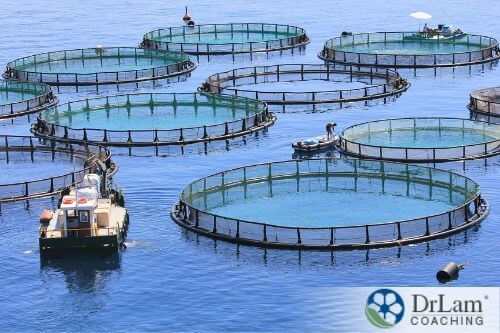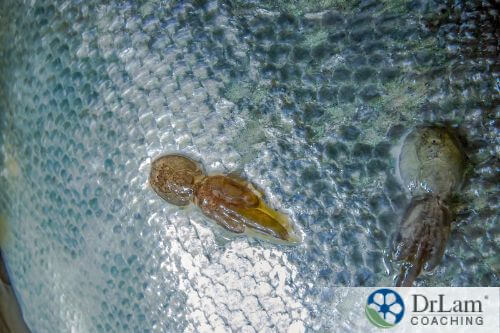 As we try to eat a healthy diet, more people are turning to fish as a healthier protein option. However, while fish is healthy, on the one hand, eating more fish does put additional strain on the world’s fish resources. As a result, many fish outlets turn towards supplying their customers with farm raised fish. This has its benefits, but also its drawbacks.
As we try to eat a healthy diet, more people are turning to fish as a healthier protein option. However, while fish is healthy, on the one hand, eating more fish does put additional strain on the world’s fish resources. As a result, many fish outlets turn towards supplying their customers with farm raised fish. This has its benefits, but also its drawbacks.
The term "wild caught fish" refers to any seafood harvested from the ocean. In other words, shellfish, crustaceans, fish, and all other seafood, if it is harvested from the sea, it is called "wild caught." These creatures are born, grow to adulthood, and are fished in their natural habitat: oceans and seas. They consume a varied, natural diet, and are given no medications designed to ensure their health. Humanity has relied on this kind of fish as a food source for eons.
However, with an increase in population, the increasing demand for fish as a food source, and changes to fish habitats, fish populations across the globe are dwindling. This has contributed to the rise of fish farmers who cultivate certain fish species in a controlled environment to meet the demand. Hence the term "farm raised fish."
In the sea, it is about the survival of the fittest. If ill, a fish may die and become absorbed into the food chain. They also eat what they can find, thereby ensuring a varied diet. This, of course, contributes to their taste.
Wild caught fish just tastes better than their farm raised counterparts. This is due to their varied diet. Their varied diet also ensures better coloring. Furthermore, because they swim vast distances in search of food or, as in the case of salmon, to spawn, their meat has a leaner, healthier quality. They are lower in fat.
Due to the high demand for fish, sustainably supplying these fish becomes an issue. While demand rises, the fish population steadily dwindles. This could also lead to other ocean species that rely on these fish not getting the food they need. Current commercial fishing practices could also cause environmental harm.
Another consideration is the mercury levels in wild caught fish. These are higher than in their farmed counterparts. Mercury is toxic to humans.
And let us not forget about freshness. These fish, because of traveling vast distances to reach their target markets, may not taste the same as when eaten locally.
Finally, there is price. Running a fishing operation comes with overhead costs. This adds to your cost as well. Furthermore, the rise in demand but the decline in fish numbers also raises the price of wild caught fish. If things continue this way, wild caught fish may become an expensive luxury that most people cannot afford.
 Raising fish in defined pens in lakes, rivers, oceans, or large tanks as known as "aquaculture". When these pens occur in saltwater like oceans, we also use the term "ocean raised fish."
Raising fish in defined pens in lakes, rivers, oceans, or large tanks as known as "aquaculture". When these pens occur in saltwater like oceans, we also use the term "ocean raised fish."
Because of ease of catching and lower costs involved compared to commercial fishing, farmed raised fish, is both more easily available and also to tends to be much cheaper. And the supply of farm raised fish also meets the increased demand for fish sources.
Many people, however, dislike eating farm raised fish. They may taste slightly different from their counterparts living and breeding in the wild, with some species even having a different color. Salmon, a good example of this, has a grey color when raised in captivity although their wild counterparts have a well-known pink or red color. To counteract this, in captivity farm raised fish have colorants added to their food. Their wild salmon cousins eat krill that gives them their color.
Furthermore, most fish raised in captivity have a diet of grains, corn, fish oil, and ground-up fish. Wild fish do not eat this food as their standard diet.
A more sustainable fish source, farm raised fish helps to reduce the stress placed on the ocean’s wild fish populations, giving them a chance to increase in number. The sustainability of this type of fishing practice also attracts many customers who see it as an eco-friendly option as opposed to ocean fishing.
Another consideration is availability. Fishing in the oceans has certain rules attached. You can only catch certain species during certain times of the year so that they can move to their spawning grounds and reproduce, for example. But you can harvest farm raised fish as the need arises, thereby supplying the demand.
The fish produced also tends to be much cheaper because of the lower overhead costs in this type of business when compared to a commercial fishing operation.
Farm raised fish also contain more omega-3 fatty acids due to being fatter than their wild ocean-going counterparts. They seem to also have less mercury than wild fish.
The close quarters that farm raised fish are kept in often give rise to various health issues. This often requires the use of medications such as antibiotics.
This close proximity also results in their environment becoming filled with various toxins in which they must swim. These toxins can end up in the fish you eat and in the surrounding areas.
We often hear about the pollution in our oceans. Studies show, however, that farm raised fish are exposed to higher levels of pollution than those swimming freely. A 2020 study, for example, showed that farmed salmon contained more microplastics than their ocean-going counterparts. Another study at two American universities found that farm raised salmon have significantly higher arsenic levels than their wild counterparts.
 These toxins could also easily spread to areas surrounding the fish farm. This could not only affect free-swimming fish in the area, but also affect other animals using the water sources. For example, fish farms may encourage parasitic infestation in the contained fish population. A study in Norway, for example, shows that up to 20% of fish farmed in captivity may die due to an infestation of sea lice. Fish farmers commonly use toxic chemicals to get rid of these lice.
These toxins could also easily spread to areas surrounding the fish farm. This could not only affect free-swimming fish in the area, but also affect other animals using the water sources. For example, fish farms may encourage parasitic infestation in the contained fish population. A study in Norway, for example, shows that up to 20% of fish farmed in captivity may die due to an infestation of sea lice. Fish farmers commonly use toxic chemicals to get rid of these lice.
Farmed raised fish, due to little exercise, are also fatter and have more calories. While some of these are healthy omega-3s, they lack elements wild fish get from swimming in the sea and consuming a varied diet.
Many fish also escape from fish farms each year. These fish, exposed to various chemicals and often diseased, often land up in the wild where they infect other fish populations.
Both wild and farm raised fish contain certain toxic substances. Although considered safe in small amounts, these toxins could cause health issues, especially in those with pre-existing conditions or adrenal fatigue.
Inflammation happens as your body starts defending itself against toxins and various pathogens. These include heavy metals like mercury. This automatic response, part of your immune defense, also forms part of your NeuroEndoMetabolic (NEM) stress response. The main reason for inflammation is that it is your body’s way of protecting itself against harm. If inflammation persists, however, it could result in serious health issues in the long term. This often occurs in the event of excess toxin accumulation that triggers a hyperactive response in the immune system. A hyperactive immune system due to toxins or inflammation can contribute to the development of autoimmune disease.
Everyone's needs are different. You have to weigh up the pros and cons of each and make the choice that you feel suits your family’s needs best. Before making your next fish purchase, however, make sure you get what you pay for. This may mean making inquiries about the origins of your purchase.
Do remember, though, that wild-caught fish may taste better, have a lower fat content, and not have been submitted to possible unsavory farming practices. If opting for farm raised fish, know that you are supporting the preservation of the world’s marine ecosystems.
Fish is a great protein source and is often one of the best sources of omega-3 fatty acid. It will remain a staple in many households. But know that where your fish comes from makes a big difference in what you are getting.
In the choice between ocean caught or farm raised fish, here are a few things to remember:
If you would like to know more about how to choose the best lean meat for your body, the team at Dr. Lam Coaching can help. We offer a free* no-obligation phone consultation at +1-626-571-1234 where we will privately discuss your issues and assorted options. You can also send us a question through our Ask The Doctor system by clicking here.
Consuming farm raised fish has its upsides and downsides. They don't necessarily have more or fewer nutrients, but they do have a slightly different mix of nutrients due to their upbringing. They have less mercury but may have more of other toxins like arsenic. Choosing the healthiest fish is more complex than it seems.
